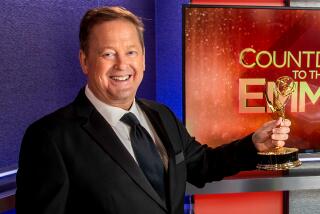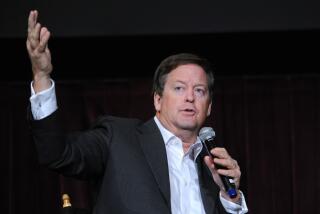Correspondent Sam Jaffe Dies; Was Ruined by Spy Allegation
- Share via
Veteran network correspondent Sam Jaffe, who was forced to spend the final years of his life denying that he was a Soviet spy, is dead of cancer.
Jaffe was 55 when he died Friday at his home in Bethesda, Md., a suburb of Washington.
Jaffe had been a correspondent for Life magazine and CBS before joining ABC television in 1960. A year later he opened ABC’s first Moscow bureau, but four years later he was thrown out of the country in apparent retaliation for a colleague’s report that there was a major power struggle under way in the Kremlin.
(Jaffe later said that he had transmitted stories to ABC in New York, denying the existence of a shake-up, but his denials were not broadcast.)
Won Prizes for Coverage
He was reassigned to Hong Kong and, after winning prizes for his coverage of Vietnam, returned to Washington in 1968. Soon afterward, the FBI and CIA reportedly began suggesting that Jaffe had been a spy for the Soviet Union.
Jaffe was never charged with espionage and the reasons for the reports have never been publicly explained.
“The last nine years have been incredible,” Jaffe told the Washington Post in 1979.
“If it weren’t for a few friends, I would be broken.
“I say I am not a Russian spy. The FBI says, ‘Yeah, you are.’ Well, I want them to prove it. I want it all out in the open. I want my family cleared.”
By then the CIA had sent him a letter saying an investigation had determined that he indeed was a loyal citizen. And last year U.S. District Judge Barrington Parker ruled that the FBI had no grounds for ever suspecting Jaffe.
But by then Jaffe’s broadcast career was in shambles and he spent the final years of his life helping his second wife, Jeune, in her flower shop.
Covered U-2 Spy Trial
Over the years Jaffe covered many of the major political developments in the world’s shifting political climate. He was a free-lancer in 1955 when he went to Indonesia to cover a conference of Third World nations. While there he interviewed Premier Chou En-lai of China. He covered Soviet Premier Nikita S. Khrushchev’s first trip to the United States in 1959.
With CBS, he covered the Moscow trial of U-2 spy Francis Gary Powers and filed dispatches on Soviet actions during the 1962 Cuban missile crisis.
He witnessed the signing of the atmospheric nuclear test ban treaty and the beginnings of detente and was among the first to report Khrushchev’s fall from power in 1964.
In addition to his wife, he leaves four children.
“If I should drop dead,” he had told the Post while still carrying on the struggle to clear his name, “I don’t want them living with this stigma.”
More to Read
The complete guide to home viewing
Get Screen Gab for everything about the TV shows and streaming movies everyone’s talking about.
You may occasionally receive promotional content from the Los Angeles Times.






